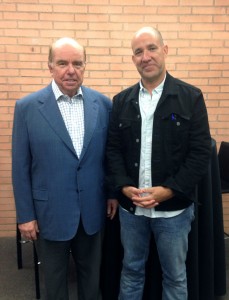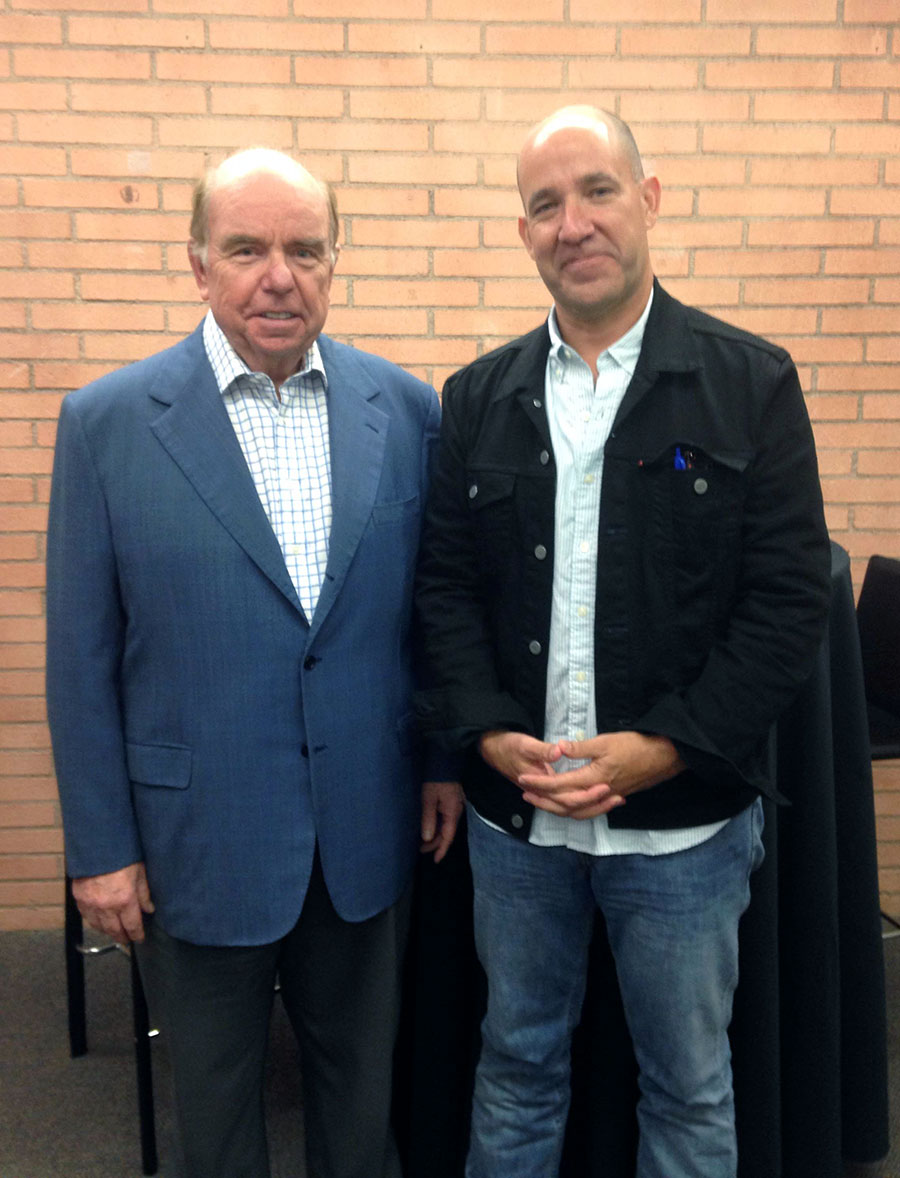Panel discusses issue of trust in US politics
Matthew Dowd, ABC News political correspondent and campaign strategist, came to speak with Dornsife College of Letters, Arts and Sciences professor and former political consultant Bob Shrum on Tuesday as part of the Department of Political Science’s Political Conversations series on Tuesday.

A house divided · Dornsife Professor Bob Shrum (left) and ABC News political correspondent Matthew Dowd (right) spoke on campus Tuesday. – Emma Peplow | Daily Trojan
Shrum has worked on campaigns including the Gore-Lieberman and Kerry-Edwards presidential campaigns.
Dowd, who worked as a chief strategist on the 2004 Bush-Cheney presidential campaign and the 2006 Schwarzenegger California gubernatorial re-election campaign, took part in a conversation titled “The Loss of Trust and the Future of America.”
The event began with Shrum asking Dowd questions about the current political landscape before opening the room up to questions from the audience.
Shrum, a friend of Dowd’s despite their work for opposing parties, began his questioning on the topic of trust in American institutions.
“I think we are at a point of time where the loss of trust is at the lowest point it has been,” Dowd said. “Every institution in the country has lost trust simultaneously.”
He described how this loss of trust is not limited solely to the government and bureaucracy. According to Dowd, this distrust has also extended to corporate institutions that are now seen as being more interested in profit than the welfare of their employees. He said that mistrust has risen even in the world of sports, where recent performance enhancement allegations are leaving the populace wondering who they can trust.
“I think we are at a very traumatic time,” Dowd said. “There are a lot of people struggling with where [they] belong. I think in [this time] it’s a great opportunity if leaders emerge in the right way.”
Moving forward to the upcoming 2014 midterm elections and 2016 presidential election, Dowd felt that the candidate who wins, regardless of party, needs to actively work to impact change in the government.
“The country wants someone to emerge,” he said. “People want a leader of the country and then leader of the party far down the list. It’s time to make some transformational change in the way the country is run.”
Regardless of whether the Republicans or Democrats win the midterms, Dowd said he fears that the two parties will misinterpret the victory as Americans being in support of where their party is headed in a time when both parties have historically low approval ratings. He describes the Republican Party as “a Mad Men party in a Modern Family world” and the Democratic Party as having to overcome the president’s poor approval rating.
Identifying himself as an independent, Dowd identified polarization as a serious issue in American politics today, saying that 30 years ago, 75 percent of people were likely to live next door to someone of a different political affiliation — today, this is only true for 25 percent of people. He partially attributes this to the growth of media.
“It’s much easier to confirm our beliefs,” he said. “We are uncomfortable with information that might prove we are wrong.”
Dowd also described his experience working closely with President George W. Bush. He also said that Bush’s presidency was quickly disrupted by the 9/11 terrorist attacks.
Dowd had been asked by the White House to conduct polling on Sept. 10, 2001, to see how the American populace was feeling about domestic and economic policy, and he was asked to fly out to Washington, D.C. on Sept. 11 to brief the White House on his findings.
“There was not a single question about foreign policy mentioned in the poll,” Dowd said.
According to Dowd, that changed with the involvement of former Vice President Dick Cheney, who took on a greater role in managing White House policy after the 9/11 attacks.
“The Vice President didn’t care much about domestic issues. He either wouldn’t come to the meetings or didn’t participate,” Dowd said. “That changed on Sept. 11.”
Dowd said Cheney became much more involved in White House affairs due to his past experience in foreign policy. Dowd described the former Vice President’s interests as “not bipartisan.”
Following how the country has shifted with both the Bush and Obama presidencies, Dowd said that the most important factor in the next presidential election is finding an effective leader.
“Ultimately presidential and national elections are about big values,” he said. “We want someone who is strong and has a sense of community.”
community.”

